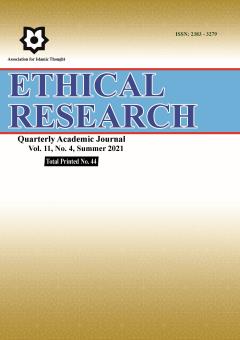Managerial ethics in Marzbannameh and the advice of the kings
Subject Areas : Ethical contexts of behavior in other sciences
1 -
Keywords: Managerial ethics, the advice of the kings, Saadi, Marzbannameh, Varavini.,
Abstract :
Nasihat al-Muluk Saadi and Marzbanehnameh, the work of Marzbaneh Banurstam, which was later adorned and written by Varavini in complex technical prose, are two works of historical treasure of Persian literature, each of which in its own style, principles and principles of management. And have shown the ethical models of management, which at that time were very similar and symmetrical with the ways of governing and governing. In both works, the necessity of observing and protecting the moral and religious teachings and the creature of the king to the virtues and desirable moral qualities such as benevolence and forgiveness, justice and fairness, moderation, cheerfulness and democracy and the like, are warned. Also, paying attention to those around and subordinates, how to deal with them, the quality of interaction and treatment with different sections and classes of people, as well as how to deal with enemies and ill-wishers, have been the most important issues that these two works have addressed. The study of these works clearly shows that Saadi in his advice to the kings, without any hesitation, has expressed his intention in the form of very clear and explicit advice addressed to the ruler and sultan of the society, while in Marzbanameh, this is important using technical language. And it is very busy and full of different literary industries and in the form of allegories and legends from the language of different animals and beasts and in the envelope of multifaceted and cryptic words, which, of course, despite the differences and differences in the two works, can be close and He found many similarities in their general and fundamental concepts and themes, which were how to manage, policy and governance.
قرآن کریم
نهجالبلاغه(1378). ترجمه¬ی سید جعفر شهیدی، تهران: نمازی.
اورنسون، الیوت (1362). روانشناسی اجتماعی. حسین شکرکن، اهواز: دانشگاه شهید چمران.
پرهیزکار، کمال (1375). تئوریهای مدیریّت. تهران: آگاه.
ترواثا، رابرت (1369). اصول مدیریّت و رفتار سازمانی. عیناله علا، تهران: زوار.
حسینی، سید مهدی(1388). تحلیل نامه¬ی امام علی به مالک اشتر. تهران: نواب.
دسلر، گری (1373). مبانی مدیریّت. ترجمه¬ی داوود مدنی، تهران: پیشبرد.
سعدی، مصلحالدّین(1369). گلستان. تصحیح غلامحسین یوسفی، تهران: خوارزمی.
ــــــــــــــــــ (1386). کلیّات سعدی. بر اساس تصحیح محمد علی فروغی، چاپ اول، مشهد: به¬نشر.
سیاسی، علیاکبر (1371). نظریّههای شخصیّت. تهران: دانشگاه تهران.
عبید زاکانی(1387). اخلاقالأشراف. تصحیح علی اصغر حلبی، تهران: اساطیر.
عنصرالمعالی، کیکاووس بن اسکندر(1386)، قابوسنامه. به اهتمام غلامحسین یوسفی، تهران: شرکت انتشارات علمی و فرهنگی.
غزالی، امام محمد(1364). کیمیای سعادت. تهران: علمی و فرهنگی.
قائمینیا، محمد(1389). توصیههای لقمان حکیم. تهران: آذرخش.
کلینی، بیتا، اصول کافی، ترجمهی سیّد جواد مصطفوی، تهران، دفتر نشر فرهنگ اهل بیت.
نجفی، علیرضا(1389). شرحی بر تجارب الأمم. تهران: حکمت نوین.
نظامالملک طوسی، ابوعلی حسن بن علی (1388). سیاستنامه. تصحیح عباس اقبال، تهران: اساطیر.
وراوینی، سعدالدّین(1355). مرزباننامه. تصحیح محمد روشن، تهران: بنیاد فرهنگ ایران.


